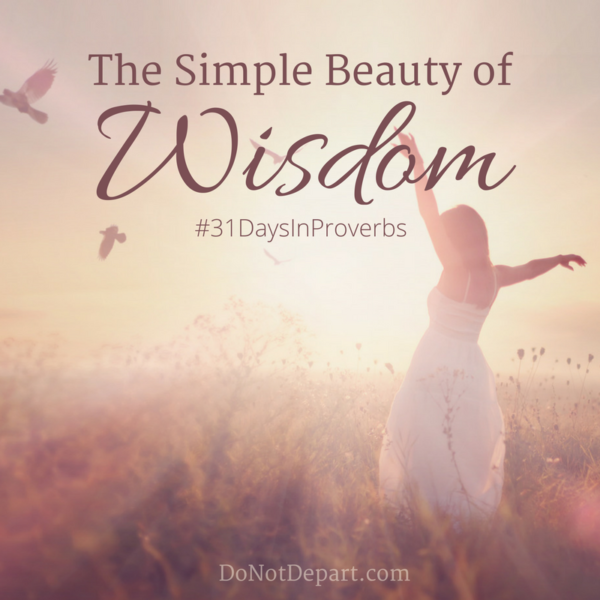We have come to the end of our 31 days in the book of Proverbs. At times convicting, at times inspiring, this collection of “the words of the wise and their riddles” (Proverbs 1:6) has taken us on a journey of truth in search of wisdom.
And like a lovely package all tied up, Proverbs begins with the fear of the Lord (Proverbs 1:7) and a woman (Proverbs 1:20-33), and it ends with the fear of the Lord (Proverbs 30:30) and a woman (Proverbs 31:10-31).
We see a style shift in chapters 30 and 31. Chapter 29 concluded another set of one-verse proverbs, and now in chapter 30 we embark on longer lessons that use numerical parallelism and poetry to convey truth.
In addition, both Proverbs 30 and Proverbs 31 are explicitly attributed to someone other than Solomon, though a few scholars think these may be nicknames for him. We actually know nothing about either Agur (chapter 30) or Lemuel (chapter 31), other than the fact that what they recorded was deemed worthy to be included in Holy Scripture.

Proverbs 30—The Wisdom of a Simple Man
Agur is a humble man. The first section of Proverbs 30 is a clear reminder, necessary in a book about wisdom, that no matter how wise a human may become, no one will ever be as wise as God. True human wisdom leads to fearing God, and taking refuge in Him and in His Word (verse 5). We can not add to nor detract from God’s Word – it has been tested and stands.

After describing some very unsavory characters (the sort of people who are spiritual fools), Agur moves into five sets of numerical parallel proverbs that are riddle-like. The words in this section paint a picture of the physical world with bright brush strokes. These Holy Spirit inspired pictures help us to understand deeper, spiritual realities: the greatest emptiness is life without God, His creation is awe-inspiring and mysterious, being small or unimportant does not preclude being wise.
Words and our use of them, or perhaps more accurately, our restraint from using them, are a major theme throughout the entire book of Proverbs. At this point, it’s time to be blunt: “put your hand on your mouth” (verse 32). This verse makes me laugh—I think we have all had moments when this would have been the best choice!
Proverbs 31—Eshet Chayil—The Virtuous Woman
As a mama, it brings joy to my heart that this entire chapter is a teaching from mother to son. Lemuel has paid attention to Proverbs 1:8-9:
Hear, my son, your father’s instruction,
and forsake not your mother’s teaching,
for they are a graceful garland for your head
and pendants for your neck.
Proverbs 1:8-9
In the first nine verses of Proverbs 31, King Lemuel’s mother gives him wise advice for leadership: do not be distracted by alcohol or women. A good leader focuses his strength on serving, not on indulging his appetites. She also exhorts him to speak up for those who have no voice: the afflicted, the poor, the unfortunate. A wise leader is one who thinks of others over himself and is compassionate.
Lemuel’s mother then moves on to describing an excellent wife. Verses 10-31 are an alphabetic acrostic poem. Each of the 22 verses starts with a different letter of the Hebrew alphabet. There are a number of reasons why the acrostic form might have been used, a simple one being that it makes a passage easier to memorize. This theory seems supported by the fact that these verses are traditionally memorized by Jewish men to sing to their wives as praise during the Sabbath meal. Imagine being blessed weekly by having these verses sung over you by your husband?
Many women shudder when they hear mention of Proverbs 31. “This stresses me out,” “An impossible to-do list!,” “I don’t know how to spin wool!” For some reason many Christians have taken this passage and turned it into a source of shame for women, when it is not meant to be a snapshot in time, but rather the arc of the life of a virtuous woman, or Eshet Chayil אֵשֶׁת חַיִל.
Think for a moment of Ruth. Ruth was a widow, a foreigner, and desperately poor. The only way she survived was by going into the fields after a harvest and gathering what was left behind. She did not have her own home, or servants, or fancy scarlet clothes like the woman in Proverbs 31. No husband to sit in the gates. And yet when Boaz spoke of her before their marriage, he called her Eshet Chayil, just like the Proverbs 31 woman!
You see, all the things the Proverbs 31 woman does are the fruit of her wise choice to fear the Lord. Getting up in the dark hours of the morning (Proverbs 31:15) or buying a field (Proverbs 31:16) aren’t what make her virtuous. She does those things because she loves God, and in her life, that’s what serving Him wisely looks like.
Does your husband work very late so you stay up to welcome him home, then are too tired to get up before dawn? Blessing your husband shows wisdom, so in your case getting up early is not the right choice. Do you make wise decisions about money so that you are a blessing to your family finances? That’s your field.

Proverbs 31 may seem like a picture of a complicated life, but in fact, it is beautifully simple, and summed up in verses 30-31, the final verses of Proverbs:
Charm is deceitful, and beauty is vain,
but a woman who fears the Lord is to be praised.
Give her of the fruit of her hands,
and let her works praise her in the gates.
Proverbs 31:30-31
God cares about our insides first. Running around trying to look like the Proverbs 31 woman is like trying to heal a wound by putting makeup on it. It might look okay for a while, but it makes the infection worse. When the focus of our hearts is on God, the rest falls into place.
#31DaysInProverbs—Our Whole Series
Our month in Proverbs has come to an end. Take a look back through all we have learned! The thirty one chapters of Proverbs are filled with advice, admonition, and observations on the nature of God’s world and humanity. The wisdom of Proverbs is practical, yet also addresses the spiritual realities of the eternal kingdom.
- Printables for Studying Proverbs
- Proverbs to Memorize
- Proverbs 1-2 – Wisdom for Today
- Proverbs 3-5 – Who Is Wisdom?
- Proverbs 6-7 – Practical Warnings
- Proverbs 8-9 – Wisdom Is Calling You
- Proverbs 10-12 – Contrast Between Right and Wrong
- Proverbs 13-16 – Give Attention to the Word
- Proverbs 17-19 – Wisdom for Relationships
- Proverbs 20-23 – 4 Life Lessons for Kids of All Ages
- Proverbs 24-26 – The Source of True Wisdom
- Proverbs 27-29 – More Themes in Proverbs
- Proverbs 30-31 – The Simple Beauty of Wisdom
We make things complex, but they needn’t be. Fear God and you will grow in wisdom, then you will know how to live. This is the simple beauty of the wisdom that is shared in Proverbs.


This was a blessing to read. Thank you!